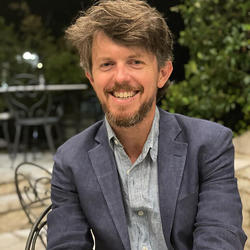Byron MacDougall
Byron MacDougall teaches courses on ancient and medieval literatures—especially ancient and Byzantine Greek literature—and their modern reception. Before coming to RISD, he taught at Brown University, the University of California Davis, and Salve Regina University, and he has held research fellowships at Dumbarton Oaks, the University of Vienna, Princeton University, and the University of Southern Denmark. His research focuses on Greek literary, philosophical, and religious culture of Late Antiquity and Byzantium. In addition to his first book, Philosophy at the Festival: The Festal Orations of Gregory of Nazianzus and the Classical Tradition (Brill, 2022), he has written for such academic journals as Greek, Roman, and Byzantine Studies; American Journal of Philology; Dumbarton Oaks Papers; The Medieval Review; Harvard Studies in Classical Philology; and Byzantine and Modern Greek Studies, among others.
